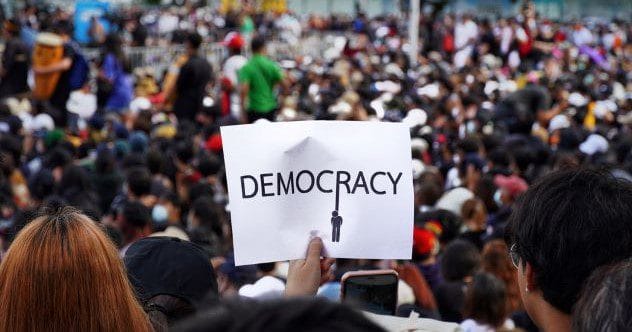The 21st century has witnessed numerous dramatic coup attempts, characterized by bold actions aimed at overthrowing established governments. These events are often marked by suspense, conflict, and unforeseen developments, capturing global attention. Whether driven by political disagreements, power struggles, or personal ambition, each coup attempt unfolds as a compelling narrative of a nation’s critical moment in history.
Spanning across Latin America, Africa, and Asia, these coups expose the vulnerabilities of political systems. They highlight the extreme measures taken to seize control and the unwavering resolve of those defending their governments. These instances are more than mere power plays; they are intense dramas with profound, real-world ramifications, affecting countless lives and reshaping countries.
Let’s delve into ten of the most audacious coup attempts of the 21st century, examining the ensuing chaos, the key figures involved, and the repercussions that followed. These accounts provide insight into the dynamic nature of political power and the remarkable endeavors to usurp it.
Bolivia: The High-Stakes 2024 Coup Attempt
In June 2024, Bolivia was thrust into the spotlight following a high-stakes coup attempt that gripped international observers. Dissatisfied with the current administration, a segment of the military launched a surprise assault on vital government buildings in La Paz. This meticulously orchestrated coup involved the deployment of troops to strategic sites throughout the city.
However, the coup plotters encountered unexpected opposition. Government loyalists and civilian supporters quickly mobilized, transforming the streets of La Paz into contested zones. These clashes resulted in substantial damage and numerous casualties, plunging the city into turmoil.
The global response was immediate, with neighboring countries and major powers denouncing the coup and advocating for a peaceful resolution. Diplomatic interventions played a crucial role in restoring order, leading to the arrest of the coup leaders. This audacious attempt is likely to leave a significant scar on Bolivia’s political landscape, underscoring deep-seated divisions and the ongoing quest for stability. [1]
Turkey: The Night of the 2016 Failed Coup
In July 2016, Turkey descended into chaos as a faction within the Turkish Armed Forces tried to depose President Recep Tayyip Erdoğan. Tanks appeared on the streets of Ankara and Istanbul, jets flew overhead, and soldiers seized control of critical infrastructure, including key bridges and media outlets.
The coup’s instigators aimed to overthrow President Erdoğan and reinstate what they purported to be democracy and constitutional order. However, their efforts were immediately met with resistance. President Erdoğan, addressing the nation via a video call while on vacation, urged citizens to take to the streets in defiance. Thousands responded, swarming the streets and confronting the soldiers.
The combined resistance from civilians, loyal military divisions, and police forces shifted the momentum against the coup plotters. By daybreak, the coup had failed, leaving over 300 dead and thousands injured. The government swiftly regained command, arresting thousands of military personnel, judges, and civil servants suspected of involvement. This failed coup profoundly impacted Turkey, leading to extensive purges and a severe clampdown on dissent. [2]
Myanmar: The 2021 Military Takeover Shocker
In February 2021, Myanmar’s military orchestrated a stunning takeover, detaining civilian leader Aung San Suu Kyi and other leading figures from the National League for Democracy (NLD). The coup occurred just as the newly elected parliament was preparing to convene following the NLD’s sweeping victory in the November 2020 elections. Alleging widespread electoral fraud, the military declared a state of emergency, seized control, and ignited widespread protests and international condemnation.
Thousands of individuals, including students, monks, and civil servants, engaged in mass demonstrations against the coup. These protests faced brutal suppression by the military, marked by numerous arrests, injuries, and fatalities. The situation in Myanmar rapidly escalated into a humanitarian crisis, characterized by extensive human rights abuses and increasing violence.
Despite international demands for restraint and the restoration of democracy, the military junta has maintained its hold on power. The coup has plunged Myanmar into ongoing turmoil, severely affecting its economy, social structure, and international relations. The steadfastness of the Myanmar people and their persistent resistance highlight the enduring struggle for democracy against authoritarian governance. [3]
Egypt: The Dramatic 2013 Military Coup
On June 30, 2013, millions of Egyptians protested against President Mohamed Morsi, marking the first anniversary of his presidency. Protesters accused Morsi and his Muslim Brotherhood of consolidating power and failing to address critical economic issues. The massive scale of the demonstrations prompted the military, under General Abdel Fattah el-Sisi, to issue a 48-hour ultimatum, demanding that Morsi address the people’s grievances.
When Morsi failed to comply, the military intervened on July 3, 2013, removing him from power, suspending the constitution, and establishing an interim government. Morsi’s opponents celebrated this intervention as a necessary step to restore stability and democracy in Egypt. However, his supporters viewed the coup as a betrayal of democratic ideals, leading to widespread violence and clashes.
The aftermath of the coup involved a severe crackdown on the Muslim Brotherhood and other dissidents, with thousands arrested and many killed in the resulting violence. The 2013 military coup remains a pivotal event in Egypt’s modern history, reflecting the deep divisions within the country and the ongoing conflict between authoritarianism and democratic aspirations. [4]
Venezuela: The Chaotic 2002 Coup Attempt
In April 2002, Venezuela was plunged into turmoil when a coup briefly ousted President Hugo Chávez. Driven by escalating tensions and protests, a coalition of military officers, business leaders, and opposition politicians detained Chávez and appointed Pedro Carmona as interim president. This action followed a deadly confrontation in Caracas during significant anti-government protests on April 11.
The coup quickly unraveled as Chávez’s supporters, including loyalist military factions and the urban poor, demanded his return. Within 47 hours, Carmona’s government collapsed, and Chávez was reinstated. This brief coup attempt intensified Venezuela’s political polarization and set the stage for continued instability. The 2002 coup remains a crucial event in Venezuela’s history, highlighting the deep divisions and volatility within the nation. [5]
Thailand: The 2006 Military Power Grab
In September 2006, Thailand’s political landscape was upended when the military executed a coup to remove Prime Minister Thaksin Shinawatra. While Thaksin was attending the United Nations General Assembly in New York, military forces led by General Sonthi Boonyaratglin seized government buildings, declared martial law, and suspended the constitution. Thaksin, accused of corruption and authoritarianism, was left stranded abroad as the coup unfolded.
The coup received mixed reactions within Thailand. Some citizens, frustrated with Thaksin’s alleged corruption and abuses of power, supported the military’s actions, hoping for a return to stability. However, many others condemned the coup as a severe setback for Thailand’s democratic process. The new military-installed government promised reforms, including drafting a new constitution and holding elections, but political tensions remained high.
This coup marked the beginning of a prolonged period of political instability in Thailand. It highlighted the deep-rooted divisions between pro- and anti-Thaksin factions and set the stage for subsequent coups and ongoing power struggles. The 2006 military takeover underscored the fragility of Thai democracy and the enduring influence of the military in the nation’s politics. [6]
Honduras: The Controversial 2009 Coup D’état
In June 2009, Honduras faced a major constitutional crisis when President Manuel Zelaya was ousted by the military and flown to Costa Rica. This dramatic event followed Zelaya’s insistence on holding a referendum to amend the constitution, which the Supreme Court and Congress deemed illegal. The military’s intervention, justified by claims of preserving democracy, led to the installation of Roberto Micheletti as interim president.
The international community, including the United Nations and the Organization of American States, condemned the coup and called for Zelaya’s reinstatement. Inside Honduras, the removal of Zelaya sparked widespread protests and violent clashes between his supporters and security forces. Micheletti’s government faced intense scrutiny and resistance, both domestically and internationally, during its interim rule.
The 2009 coup exposed deep political and social divisions within Honduras. It also highlighted the fragility of its democratic institutions as the country grappled with the fallout from this crisis. The long-term effects of the coup continue to influence Honduran politics, underscoring ongoing tensions and challenges to democratic governance. [7]
Zimbabwe: The 2017 Military Intervention That Toppled Mugabe
In November 2017, Zimbabwe witnessed a historic change when the military intervened to end Robert Mugabe’s 37-year rule. The crisis began when Mugabe dismissed his vice president, Emmerson Mnangagwa, fueling fears that Mugabe’s wife, Grace, was being positioned to succeed him. In response, General Constantino Chiwenga led a military operation, placing Mugabe under house arrest and taking control of key state institutions.
The military insisted it was not a coup but a move to remove “criminals” around Mugabe. Massive public demonstrations erupted, with Zimbabweans celebrating the potential end of Mugabe’s autocratic rule. On November 21, amid impeachment proceedings, Mugabe resigned. Mnangagwa returned from exile and was sworn in as president, promising political and economic reforms. This intervention, while ending Mugabe’s reign, left lingering questions about military influence in Zimbabwean politics. [8]
Sudan: The 2019 Overthrow of al-Bashir
In April 2019, Sudan’s political landscape was dramatically altered when the military deposed President Omar al-Bashir after months of intense protests. Sparked by economic hardships, the demonstrations quickly evolved into a nationwide call for al-Bashir’s removal after 30 years in power. The military, led by General Abdel Fattah al-Burhan, took control, promising a transition to civilian rule.
The coup was both a moment of celebration and caution for Sudanese citizens. While it marked the end of al-Bashir’s authoritarian regime, the public continued to demand a civilian government. Protests persisted until a power-sharing agreement was reached between the military and civilian leaders, aiming to guide Sudan towards democratic elections. The 2019 overthrow of al-Bashir remains a crucial step in Sudan’s quest for democracy. [9]
Mali: The Tumultuous 2020 Military Coup
In August 2020, Mali’s political scene was upended when the military seized power from President Ibrahim Boubacar Keïta after months of public discontent. The protests, fueled by frustrations over government corruption, economic decline, and escalating violence from jihadist groups, culminated in soldiers detaining Keïta and compelling him to resign. The coup leaders, organized under the National Committee for the Salvation of the People (CNSP), vowed to restore stability and facilitate a transition to civilian rule.
The international community reacted strongly, with bodies like the African Union and ECOWAS condemning the coup and implementing sanctions, demanding a swift return to constitutional order. Despite these pressures, the CNSP remained in control, eventually negotiating with local political factions to form a transitional government. This interim administration, led by Bah N’Daw, a former defense minister, was mandated to steer the country toward new elections within 18 months.
Mali’s 2020 coup underscored the nation’s deep-seated issues, including political instability, economic hardship, and persistent security threats. The coup’s aftermath revealed the fragile state of Mali’s democracy and the complexities involved in achieving lasting governance and peace. [10]
In reviewing these ten coup attempts, we see recurring themes of political instability, military intervention, and popular discontent. Each event underscores the delicate balance between democracy and authoritarianism, highlighting the profound impact these power grabs have on nations and their people.
What are your thoughts on these events? Leave your comments below and share your perspective.










